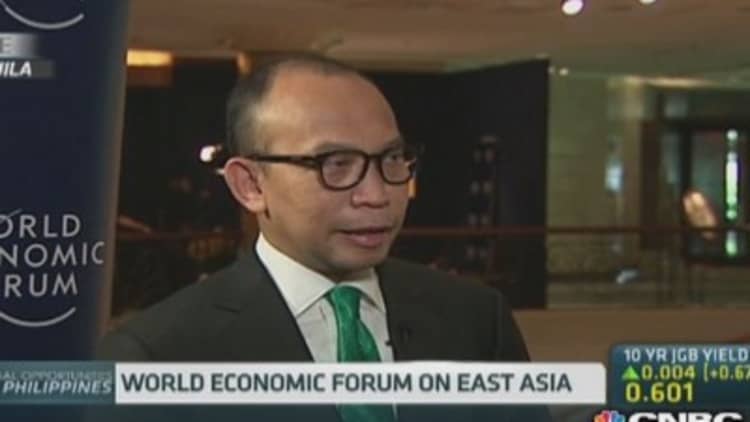As sorely-needed infrastructure investment remains elusive, reducing contentious fuel subsidies is crucial for Indonesia's next president.
Indonesians head to the polls on July 9 to elect a new president in the world's third largest democracy.
"Fuel subsidies are one issue the next government must address quickly," said Budi Sadikin, chief executive officer of Bank Mandiri – Indonesia's largest bank by assets. "When you relieve money from subsidies, it can be used for something much more productive, such as infrastructure investment."
Fuel subsidies are among Indonesia's biggest budget expenditures – greater than healthcare and infrastructure spending, according to IHS.
Read MoreCan Indonesia's economy catch a break?
In 2013, the government allotted $16.5 billion – from a total budget of about $95 billion – to fuel subsidies, and spent an extra $2 billion due to higher oil prices. This year, it budgeted $18 billion.
However, fuel subsidies are inefficient as those most in need of government assistance do not own cars, analysts said. Furthermore, energy imports contribute significantly to Indonesia's trade deficit.
Indonesia is grappling with twin budget and current account deficits, which stood at 2.2 percent and 3.3 percent of gross domestic product (GDP), respectively, in 2013. Twin deficits broadly reflect a situation where government spending exceeds revenues and the economy is importing more than it is exporting.
Read MoreIndonesia no longer a fragile five: Finance Minister
This is a source of concern among investors particularly given a backdrop of a slowing economy. Indonesia's economy grew 5.2 percent on year in the January-March quarter, its slowest pace in more than four years, down from 5.7 percent in the fourth quarter of 2013.
The economic rationale for gradual fuel subsidy cuts as interim steps towards a complete elimination is evident, said Anton Alifandi and Simona Mocuta, analysts at IHS.
Raising fuel prices would reduce demand for government-funded fuel while freeing up funds for infrastructure construction.

"At a time when the economy is struggling with slowing growth, a current-account deficit, and exchange-rate volatility…an effective way to lower the trade deficit is to reduce energy imports," say Alifandi and Mocuta.
"Trade data clearly show that the deterioration in the oil and gas component of the goods trade is a main contributor to the shift from trade surpluses to deficits in Indonesia," they added.
While the economic case is clear, cutting fuel subsidies has been a political flashpoint for decades,sometimes sparking violent protests.
Read MoreWill emerging markets throw a tightening tantrum?
President Susilo Bambang Yudhoyono has had some success increasing fuel prices but hasn't eliminated them altogether. The government's last major effort in June 2013, lifted gas prices 44 percent and diesel prices 22 percent.
Chatib Basri, Indonesia's finance minister, said it's highly unlikely the current government will further lift fuel prices before the July elections, but noted that both presidential candidates – Jakarta governor Joko "Jokowi" Widodo and former military general Prabowo Subianto – have signaled commitments to reducing the subsidy burden.
"Before we get certainty from both candidates I'm focusing on the efficiency on the government budget side and then later on so that when they decide to adjust fuel prices, our fiscal position will be in better shape," Basri said.
Read MoreAre emerging market equities finally catching up?
If elected, Widodo said he would gradually reduce fuel subsidies over a four or five-year period.
Prabowo, meanwhile, aims to maintain current fuel prices but impose measures to ensure subsidies are only used by the poor and lower middle class by requiring people to register cars and reveal their income.
"The new president will have to win the support of a fragmented parliament to push through subsidy cuts," said Alifandi and Mocuta of IHS.
"Judging from the Yudhoyono precedent, the next president is likely to aim to reduce fuel subsidies quite early, during the honeymoon period. This means that fuel subsidy cuts could happen as soon as 2015," they added.


